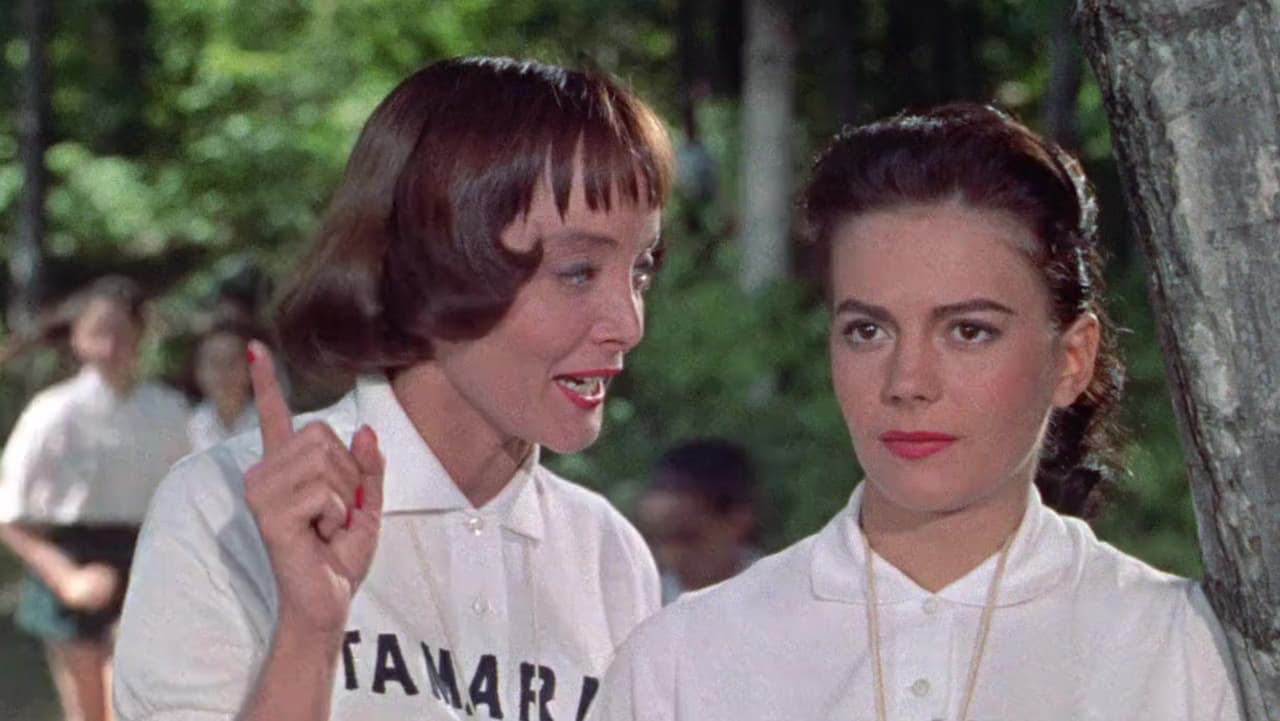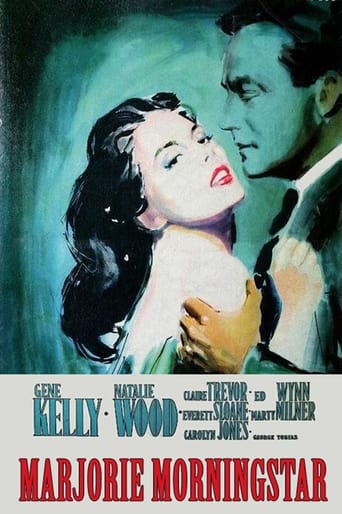Rijndri
Load of rubbish!!
Teringer
An Exercise In Nonsense
Helloturia
I have absolutely never seen anything like this movie before. You have to see this movie.
Taha Avalos
The best films of this genre always show a path and provide a takeaway for being a better person.
sroimoi-184-971491
I have watched Marjorie Morningstar on video a few times and have read others' review of it. As a Jew, I was not bothered by the stereotypes. They rang true because in that day an age, that is how parents viewed marriage for their children. Interesting that the Bar Mitzvah was held in an Orthodox synagogue where there is separate seating men and women though the religious observance of the Morgensterns is questionable. In any case, while the premise of a young woman falling for an older man with great passion is believable, Gene Kelly as Noel Airman to me was not even likable. And it is wonder why they needed to cast a 46-year old man in a role of a 33 year old. Ed Wynn and Carolyn Jones were a delight, while most of the other characters were not particularly noteworthy. The movie ending is far different from the book, and honestly, I think I prefer the movie ending though the book's end was probably more true to life.
moonspinner55
Novelist Herman Wouk's Jewish heroine, who rose from girlish camp counselor to college graduate to aspiring NYC actress, provides a meaty role for Natalie Wood, whose usual mannerisms (the breathy voice, the twitching mouth) are nicely modulated by director Irving Rapper. Gene Kelly is terrific as the womanizing theater director whom Marjorie becomes hopelessly stuck on, and the Oscar-nominated song "A Very Precious Love" by Sammy Fain and Paul Francis Webster lends pretty uplift to their romantic scenes. Visually, the film has an uneven appearance; though photographed by the estimable Harry Stradling, the clumsy mix of rear-projection, studio sets, and on-location shooting is a bit of an eyesore. In the supporting roles, Marty (Martin) Milner is excellent as an aspiring playwright and Claire Trevor has some strong early scenes as Marjorie's insufferable mother, but Ed Wynn's bit as an uncle is gratuitous, used weakly for both comic relief and pathos. Martin Balsam's role as a doctor is curiously tossed away (perhaps landing on the cutting-room floor), yet Natalie Wood is the major surprise; although one gets the impression her costume changes and hairstyles were first priority here, Wood excels in a handful of dramatic scenes, creating convincing chemistry with Kelly even if (emotionally) the narrative is all over the place. **1/2 from ****
Harold_Robbins
This film has some of the most bizarre casting in Hollywood history - who could possibly conceive of Gene Kelly playing a Jew? Yes, an 'assimilated Jew," but a Jew nonetheless. Maybe the same Warner exec who a few years later envisioned WASP-ish Rosalind Russell as Mrs. Jacobi in A MAJORITY OF ONE? With the exception of Everett Sloane (who may have been Jewish - I've never been able to confirm this) and Ed Wynn (who was), this is the most goyishe-looking family imaginable. Claire Trevor was from Brooklyn - I guess they thought this qualified her to "pass". Everyone looks like they just got back from church, not a synagogue.Hollywood and the movie industry were built by Jews - except for Darryl F. Zanuck, all the major movie moguls - Mayer, Selznick, Cohn, Goldwyn, Warner, Laemmle - were Jewish - yet they were frightened of portraying Jews honestly on screen, and many an actor had to subdue his "Jewishness" and change his name to 'blend in' - could John Garfield have become a movie star under his real name, Julius Garfinkle? MARJORIE MORNINGSTAR hasn't held up well as a film or on the printed page - maybe in the 1950s she was the gal every young woman wanted to be or know, but when I finally got through the book a few years ago, I found her to be not only irritating but a tease of the first order - few men or women would have much patience with her superficial personality today. I wondered at the book's popularity - somehow it managed to nudge past AUNTIE MAME and become the #1 bestselling novel of 1955.
rbrtptrck
The movie suffers in two ways when compared to the magical novel about theater and love: (1) by losing the late-Depression setting, when show-business was very different than in the 1950's, and (2) by casting Gene Kelly (who himself felt he was wrong for the part) as the tall, blond Noel Airman (Warner Brothers must have lost its mind not to use its contract star Tab Hunter). But those two compunctions aside, there is no other movie like it. Natalie Wood, not yet a superstar, had to read fourteen times for the role, but all of us who loved the book knew there was no one else for it. Natalie's acting ability may have been limited to looking pretty and poignant, but there's not much else that ambitious, innocent Marjorie needs to do. This story is a loving tribute to a nice girl, and a tender acknowledgment of how hard life is for one. So far as I know, no other story captures those years when a pretty young American female has the world to choose from--or how confusing her multitude of choices are. As Marjorie slowly travels through the gauntlet of family and education (and the foggy fantasies of fame that tempt any attractive teen who draws attention and compliments) toward her inevitable, bittersweet fate, a whole world is revealed--the world of The Pretty Girl, a world of school and dates and dancing and romance--with no one really to guide her--because everyone either envies her or wants to take advantage of her. By taking her story seriously, novelist Herman Wouk created a highly individual and yet universal character, and Natalie simply WAS her. The scriptwriter did a marvelous job of condensing a long and elaborate book into an entertaining and moving photo-play--and kept enough of Wouk's dialog from the novel to give flashes of the book's insight and sophistication. All of the actors must have read the book, for they dig into their roles far deeper than the screenplay does. Not a great movie, but until someone makes a better one, it stands alone as Hollywood's most honest and endearing tribute to--The Nice Girl.

